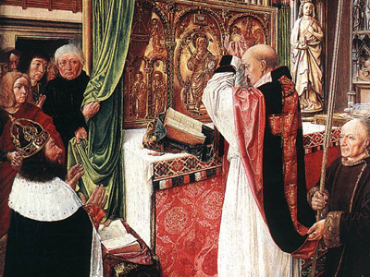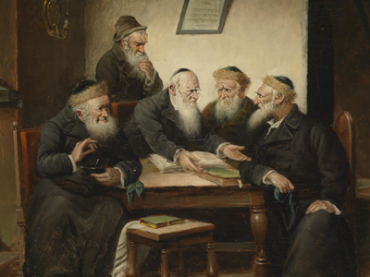Religion
St. Ephraemi Syri Theologia quantum ex Libris Poeticis Cognosci Potest Explicatur
Ephrem’s Theology as Found in his Poetry
By Albert Haase
Series: Analecta Gorgiana 584
ISBN: 978-1-61719-543-3
This study is set as a theological look at Ephrem the Syrian. After a general introduction, the author systematically examines a number of theological topics based on Ephrem’s poetry. The Syriac passages cited are also translated.
$40.00
Un traité astronomique et météorologique syriaque attribué a Denys l'Aréopagite
Edited and Translated by M.-A. Kugener
Series: Analecta Gorgiana 590
ISBN: 978-1-61719-549-5
Kugener here gives an edition of the Syriac text, along with a thoroughly annotated French translation, of this unique astronomical and meteorological treatise attributed to Dionysius the Areopagite and later used in the 13th cent. by Jacob bar Shakko.
$47.00
Studies on Magic and Divination in the Biblical World
Series: Biblical Intersections 11
ISBN: 978-1-61143-869-7
A selection of essays on magic and divination in relation to the biblical world, including Mesopotamian demonology, Akkadian literary influences, exorcism, healing, calendars, astrology, bibliomancy, dreams, ritual magic, priestly divination, prophecy, magic in the Christian Apocrypha and the New Testament, magic in rabbinic literature, and Jewish Aramaic magic bowls.
$165.00
The Epistles of Saint Peter
Series: Kiraz Commentaries Archive 9
ISBN: 978-1-61719-470-2
John Henry Jowett directs his exegesis of the Pauline epistles for the everyday consideration of challenges and grace. Study chapters are organized by verse.
$171.00
The Temple of the Kings
At Abydos (Sety I.)
By Algernon Saint George Caulfeild; In Collaboration With H. Lawrence Christie; Contribution by W. M. Flinders Petrie
Series: Analecta Gorgiana 594
ISBN: 978-1-61719-486-3
This work consists of the first architectural description of the Temple of Seti I at Abydos, reporting the first full excavation of 1902.
$48.00
Die Apologie des Aristides
Edited with an Introduction by Edgar Hennecke
Series: Analecta Gorgiana 597
ISBN: 978-1-61719-495-5
This work is a reconstruction of Greek, Armenian, and Syriac versions of an early Christian text that explains to the Emperor why Christianity is the only philosophically adequate religion.
$50.00
Tattuva-Kaṭṭaḷei, Law of the Tattuvam
A Synopsis of the Mystical Philosophy of the Hindûs
Series: Analecta Gorgiana 598
ISBN: 978-1-61719-550-1
This article is a close translation, with explanatory notes, of the treatise Tattuva-Kattalei, the law of things according to their essential nature. This treatise was probably designed as a guide or manual for the Guru.
$37.00
The Religion of the Achaemenian Kings
First Series. The Religion According to the Inscriptions
Series: Analecta Gorgiana 599
ISBN: 978-1-61719-551-8
The author sets out to uncover more about the religion of the Achaemenian Kings and the Zoroastrian religion through many different kinds of ancient inscriptions and texts, both Persian and non-Persian.
$36.00
Bar Hebraeus's Book of the Dove
Together with some Chapters from his Ethikon
Translated and Annotated by A.J. Wensinck
Series: Syriac Studies Library 153
ISBN: 978-1-61719-501-3
Barhebraeus' Book of the Dove, a manual for monks, with a spiritual autobiography, is here given in English translation with a substantial introduction (123 pages).
$184.00
Mystic Treatises by Isaac of Nineveh
Translated from Bedjan’s Syriac Text with an Introduction and Registers
Translated and Annotated by A.J. Wensinck
Series: Syriac Studies Library 154
ISBN: 978-1-61719-502-0
A.J. Wensinck (1882–1939) here offers an English translation of Isaac of Nineveh’s (late 7th cent.) mystical work, with a total of 82 chapters on various spiritual themes. An introduction and indices accompany the translation.
$196.00
De la vie religieuse chez les Chaldéens
Suivie de l'histoire du couvent catholique de Rhaban-Ormuzd et des persécutions qu'il a essuyées de la part des hérétiques et des musulmans
By Eugène Boré
Series: Syriac Studies Library 161
ISBN: 978-1-61719-521-1
In this volume, Boré (1809-1878), who traveled in the Middle East, offers a study of religious life among the Chaldeans, with much attention given to religious communities and monasticism, especially the Rabban Hormizd Monastery.
$152.00
Palästina in der persischen und hellenistischen Zeit
Ein historisch-geographische Untersuchung
ISBN: 978-1-61719-512-9
This book offers a survey of Judea, Galilee, and Coele Syria from the satrapy under Darius to the Roman reorganization under Pompey.
$117.00
Die Harmonistik im Evangelientext des Codex Cantabrigiensis
Ein Beitrag sur neutestamentlichen Textkritik
ISBN: 978-1-61719-513-6
This is a listing and classification of the instances in which Codex D, the Beza Codex, alters the Gospels to make them agree with each other.
$119.00
Die handschriftliche Überlieferung des Epiphanius
Ancoratus und Panarion
By Karl Holl
ISBN: 978-1-61719-515-0
Epiphanius of Salamis, the late fourth-century Christian author, had a passionate concern for heresy. This monograph considers the manuscript traditions of his most notable works.
$116.00
Armenische Irenaeusfragmente
Zum Teil erstmalig herausgegeben und untersucht
Edited with an Introduction by Hermann Jordan; Translated by Willy Lüdtke
ISBN: 978-1-61719-516-7
n addition to being an independent witness to his text, there is a treatise in Armenian which has not survived in Greek. With comments on the indirect influence of Irenaeus on the Armenian Church.
$142.00
Kritische Beiträge zu dem Constantin-Schriften des Eusebius
ISBN: 978-1-61719-517-4
Five questions which arose during Heikel's editing of the first volume of his collected works of Eusebius of Caesarea, the bishop, church historian, servant and biographer of Constantine. This first volume deals with the works on Constantine.
$116.00
Calendar of the Church Year according to the Rite of the Syriac Church of Antioch
Calendarium juxta Ritum Ecclesiae Antiochenae Syrorum
Preface by Ignatius George V Chelhot
Series: Syriac Studies Library 164
ISBN: 978-1-61719-416-0
This volume, printed at the Dominican Press in Mosul, is a guide to the church year for Syriac Catholics. It is prefaced by remarks of then Patriarch Ignatius George V Chelhot (1818-1891).
$159.00
Der Ketzer-Katalog des Bischofs Maruta von Maipherkat
Translation and Introduction by Adolf Harnack
Series: Analecta Gorgiana 601
ISBN: 978-1-61719-432-0
This short catalogue lists the heresies known on the Syrian frontier of the Roman Empire in the beginning of the fifth century.
$34.00
Der alte Anfang und die upsprünglich Form von Cyprians Schrift Ad Donatum
Series: Analecta Gorgiana 602
ISBN: 978-1-61719-433-7
This much-cited essay contains the third century Christian leader Cyprian's letter to his friend Donatus written shortly after his conversion.
$33.00
Der Vorwurf des Atheismus in den drei ersten Jahrhunderten
Series: Analecta Gorgiana 604
ISBN: 978-1-61719-435-1
This study is of the concept of atheotes ("godless") in antiquity in relation to Christianity.
$34.00
Der Benanbrief
Eine moderne Leben-Jesu-Fälschung des Herrn Ernst Edler von der Planitz
By Carl Schmidt; In Collaboration With Hermann Grapow
Series: Analecta Gorgiana 605
ISBN: 978-1-61719-436-8
This work reveals the uncovering of a forged letter about Jesus by the Berlin Professor of Theology with a consideration of the career and historical sense of the forger.
$54.00
Der Kural des Tiruvalluver
Ein gnomisches Gedicht über die drei Strebezeile des Menschen
By Tiruvalluvar; Translated and Annotated by Karl Graul
ISBN: 978-1-61719-449-8
The Kurals are the wisdom literature of the Tamils, at the southern cape of India; the Kural of Tiruvalluvar is the most famous of them. German translation with commentary and appendices.
$82.00
Kural of Tiruvalluver
High-Tamil Text with Translation into common Tamil and Latin
ISBN: 978-1-61719-450-4
The Kurals are the wisdom literature of the Tamils, at the southern cape of India; the Kural of Tiruvalluvar is the most famous of them. Text, modern Tamil paraphrase, and Latin translation, with English notes and glossary.
$117.00
The Theological School of Antioch 290-430 A.D.
madrasat ānṭākya al-lāhūtiyya
Series: Abrohom Nuro Library 12
ISBN: 978-1-61719-457-3
An essay expounding the historical rise and decline of the Theological School of Antioch.
$103.00
Codicum Syriacorum Specimina ad Illustrandam Dogmatis de Coena Sacra nec non Scripturae Syriacae His
Specimens of Syriac Manuscripts
Series: Analecta Gorgiana 667
ISBN: 978-1-61719-617-1
This unique volume has a discussion of the lives of the Fathers extant in Syriac texts then at the British Museum. Plates reproduce a number of fragments of these manuscripts, together with Dietrich’s descriptions.
$40.00
Filter by
Filter by price
Filter by manufacturer



























